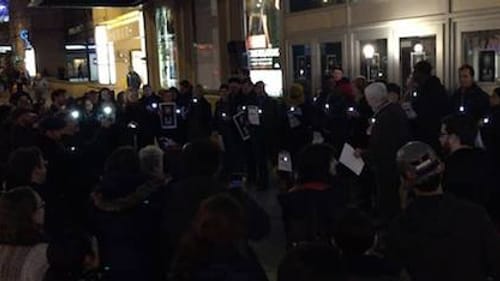Stay in the Loop
BSR publishes on a weekly schedule, with an email newsletter every Wednesday and Thursday morning. There’s no paywall, and subscribing is always free.
Letting us down by holding us up
Following up on Philly's Ghostlight Project

When I first read about the Ghostlight Project, my immediate thought was, “This is some safety-pin bullshit designed to make white people feel like they’ve done something when they haven’t done anything.” I was surprised to see that many people of color (PoC) were project originators, and not surprised when the majority of faces posting Ghostlight selfies were white.
At its worst, this was a way for theater companies to sell tickets (most community outreach programs are) off the backs of oppressed peoples. All I could think about was this image by Gran Fury, and how I have never seen bodies/stories like mine reflected at these liberal meccas. Symbolic action isn’t enough, and certainly not if it only happens in a niche community.
One month after the event, I emailed the leaders of all participating Philly organizations: “Hello, my name is Daniel Park. I am a theater and performance artist based in Philadelphia. As a queer person of color and member of Philadelphia's theater community, I’m invested in and directly affected by your participation in the Ghostlight Project. The movement called itself a chance for organizations to ‘make, or renew, a pledge to stand for and protect the values of inclusion, participation, and compassion for everyone.’ On the movement’s website, it listed a large number of potential, actionable, ongoing actions for participants to take after the event on 1/19.
I’m writing to find out what movements and plans your organization has begun since 1/19/17 to put this commitment into effect, outside of producing art.”
Some responded; others didn’t. I’m not including them all, only naming companies whose response I especially appreciated or found unacceptable, or if they did not respond at all. Ghostlight is about accountability, and these companies made a public commitment to the project.
The good
Interact Theatre Company astounded me with their sheer quantity of new programming. Most impressive: a series of program inserts serving as templates for contacting elected officials that audience members can fill out and leave at the box office; the company will mail them. Interact uses its creativity and privilege as an institution to enable audiences to take collective direct action.

The Wilma Theater’s response was simple. They said, quite honestly, “The short answer is that we've begun no new projects since then.” I commend the only theater that said, “Nothing.” While disappointing, that honesty is integral to change.
The bad
Many theaters expressed passion for Ghostlight’s values. They recognized their company’s whiteness and straightness only in private emails to me. But if they can’t accept public accountability for these issues, how can they make change? Without action accompanying passion, their promises mean nothing.
Other companies told me about past changes. They shared statistics like the number of female leads in their shows, playwrights they produced, or community partnerships (to sell tickets) they had formed. Generally these examples masked the real answer: They weren't doing anything new.
Another popular response was, “I know you aren’t asking about our art, but our art is our action.” The problem here is twofold. First, these companies produce for self-identified liberal audiences, so they’re preaching to the choir. Second, I defer again to Gran Fury.
As a queer PoC, I was most offended when people responded by saying “I’d love to hear how you think our organization can move forward.” I told everyone who asked I’d be happy to meet as a consultant and would charge an appropriate fee for my time. Only one company, the smallest of those I contacted, agreed, but hasn’t yet followed through.
None of these organizations guaranteed any change through programming, policy-making, or dedicated resources. “It would be nice if we had more non-white people on staff,” they crooned, without setting hiring policies or investing resources to train PoC to take on those positions. Theaters often receive public and private funding to diversify, but if they repeat the same ineffective action, nothing changes.
The ugly
Two companies deflected the question back at me.
Azuka Theatre Company initially responded suspiciously: “I'm curious as to why you're asking...” Eventually, a female staffer answered, taking over for the company’s artistic director.
Theatre Exile responded by questioning the legitimacy of my concerns and the intention of my question and using evidence of past growth to answer the question of future policy or program changes. They also advised me to contact InterAct if I was interested in “more overt political action.”

I answered by quoting Ghostlight’s mission statement: “This is not a substitution for protests or direct action, but rather a pledge for continued vigilance and increased advocacy.”
I also tried to help by reframing my initial inquiry and said, “If a specific question helps guide your answer, it could be, ‘As a primarily white-run institution, how is Theatre Exile working to change that and increase diversity among its administrative staff, and how is the organization using its privilege to create more and consistent opportunities for artists of color, both literally as bodies on stage as well as in leadership roles?’ But, again, this may not be the right question. I don't know what the commitments of the Ghostlight Project meant for your organization. You know your organization much better than I do.’”
The company’s response to my open-ended question was long, defensive, and included this paragraph: “I have spent my life navigating profiling of one kind or another. I have seen people act from their most prejudiced selves without any ill intent or without understanding that what they are doing is an act of prejudice. With that in mind, in order to address your use of the highly politicized word ‘privilege,’ I’d love to hear your definition of it. How many companies have you approached, which ones are they, who responded? I’d also like your thoughts on the changes that have already occurred in Theatre Exile’s 20-year history and whether or not that fits your description of change. And finally, since you indicated that you didn’t email me because you wanted to participate, I am curious as to your goal from this email.”
I answered that I hoped to write about my findings, but again, they said that until I answered their questions, they could not answer mine.
The M.I.A.
I received no response from EgoPo Classic Theatre, Philadelphia Theatre Company, and Simpatico Theatre Project.
What now?
Public performance of solidarity is different, and less important, than long-term commitment to solidarity and action. You can say your theater is a safe, welcoming space for me, but until I see you act on your words, they are just words. This is why so many arts organizations fail to diversify their audiences.

There is also a difference between making art and making policy changes from within. Producing art may make a subtle change, but alone, this is not activism and does not mean you have helped any oppressed person. You may even benefit from tokenism or by coopting cultures and oppression. True institutional activism can include changing hiring policies for your artistic and administrative staff, donating funding or other resources toward community organizations, enabling your audiences to take action, and more.
Ghostlight could have helped arts organizations to be a light in dark times. But with no method for holding participants accountable, it fails to help anyone. It lets artists and organizations off the hook for continuing to demean and mistreat anyone who doesn’t fit into traditional white, hetero-/homonormative structures. It lets us down by trying to hold us up.
If you read this and feel the rage I felt, reach out to Ghostlight participants. Whether they know it or not, by participating, they ask you to keep them accountable. If you work at these organizations and wonder, “Was our behavior responsible or irresponsible?” -- if you have to ask, you were probably irresponsible. So, welcome! Now you can start the real work. If you are angry at me, at this article, or at those who work to hold you accountable, you are part of the problem. If you are wondering, “Where do we go from here?” I’m not going to answer that for you, because, again, it’s not my job. But I would like to direct you to the website of the Ghostlight Project.
Author's note: Light Thief Productions was not originally contacted because no information about the company was accessible. Their leadership has since reached out to me.
What, When, Where
Sign up for our newsletter
All of the week's new articles, all in one place. Sign up for the free weekly BSR newsletters, and don't miss a conversation.

 Daniel Park
Daniel Park